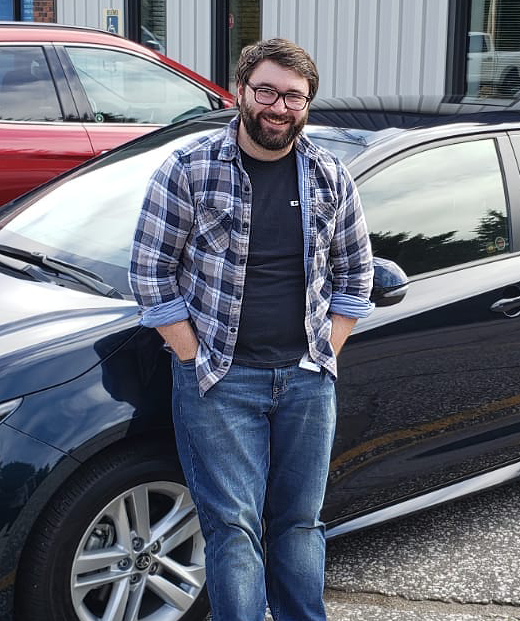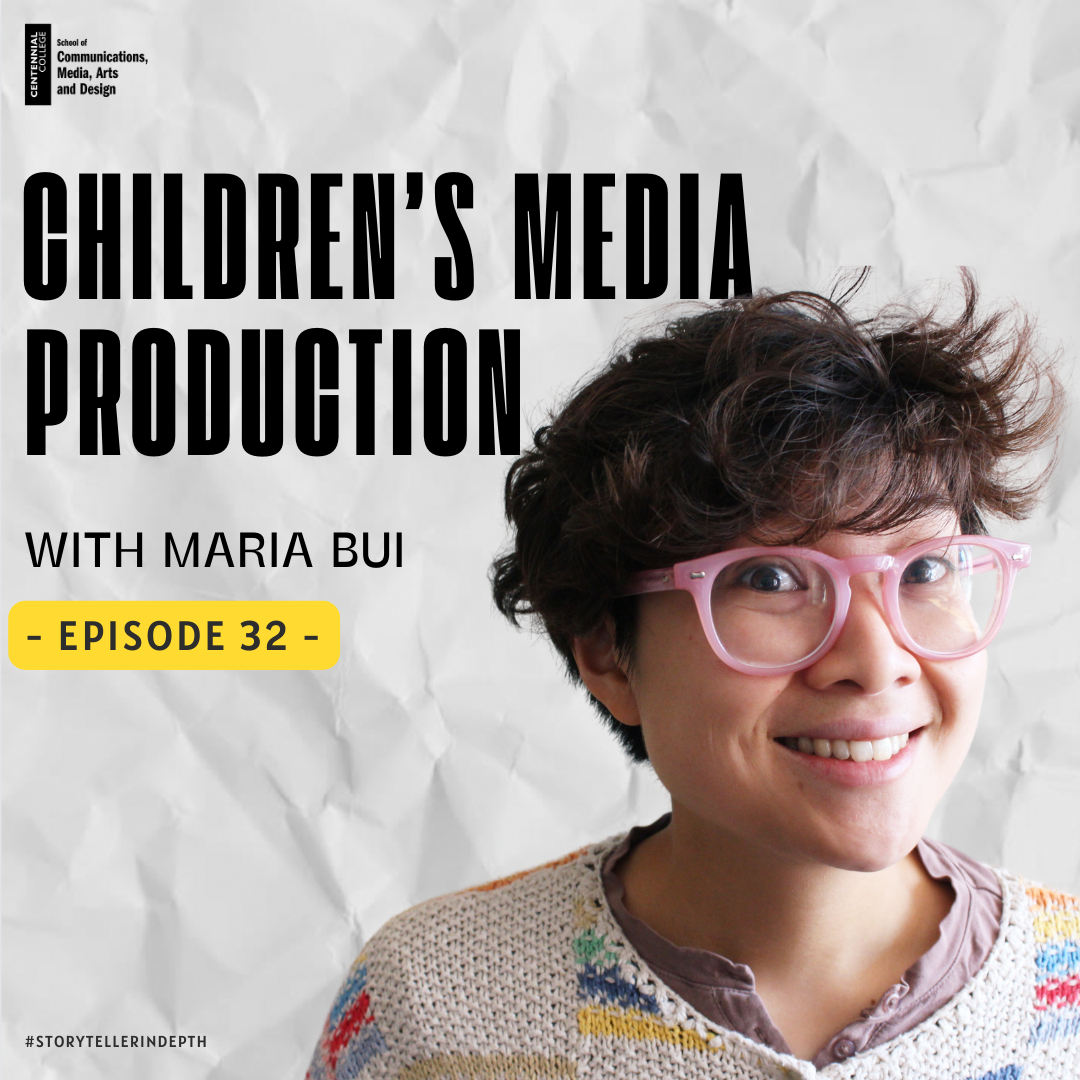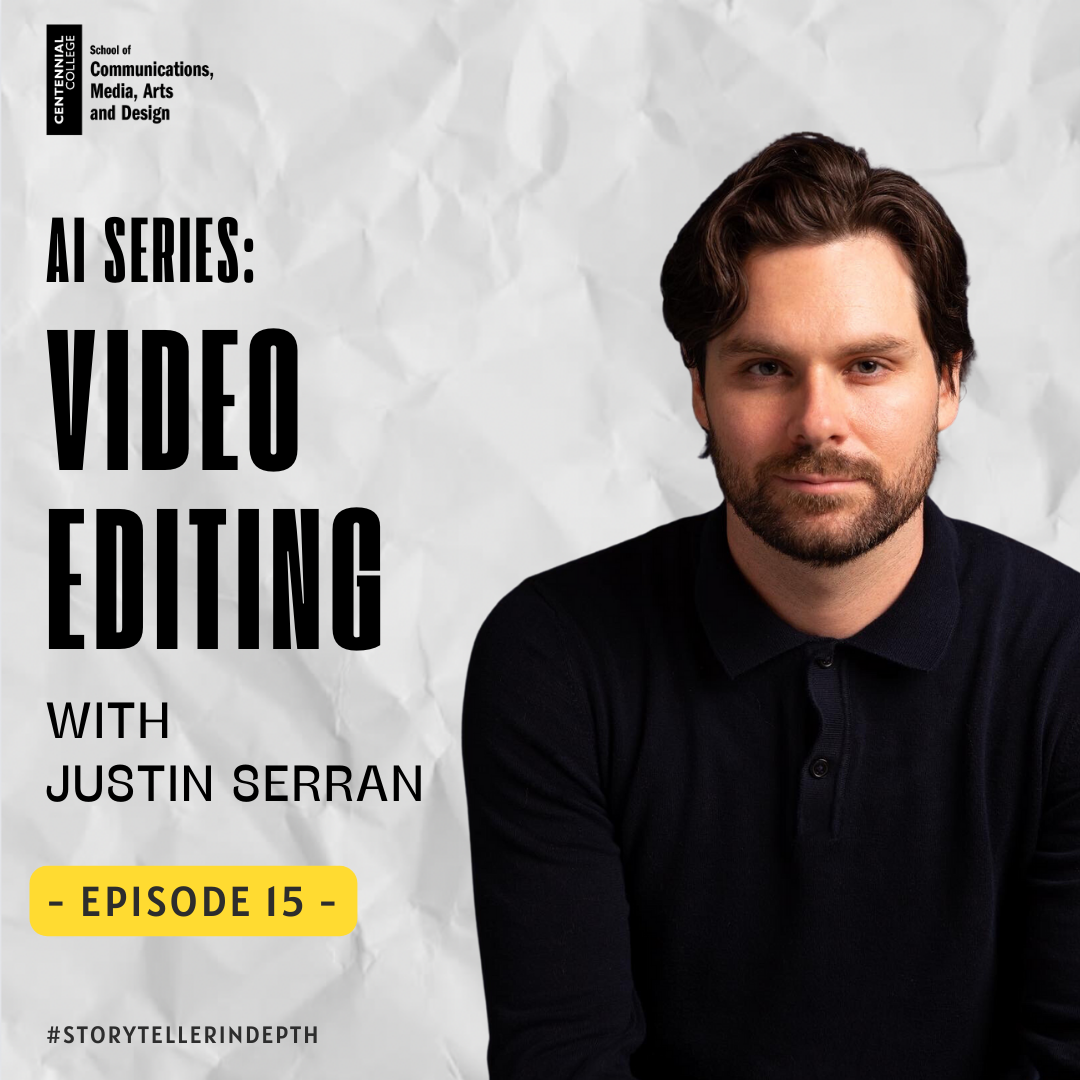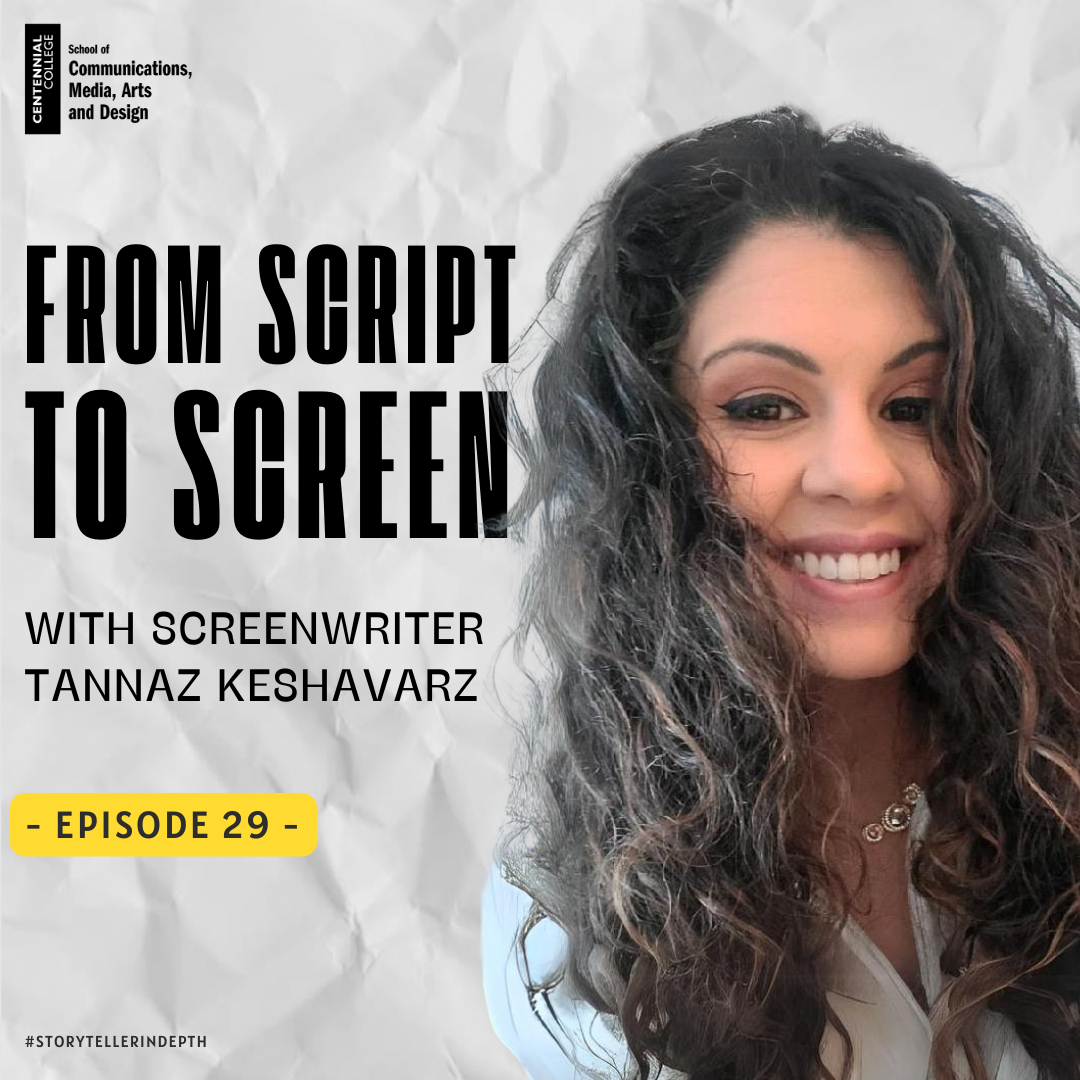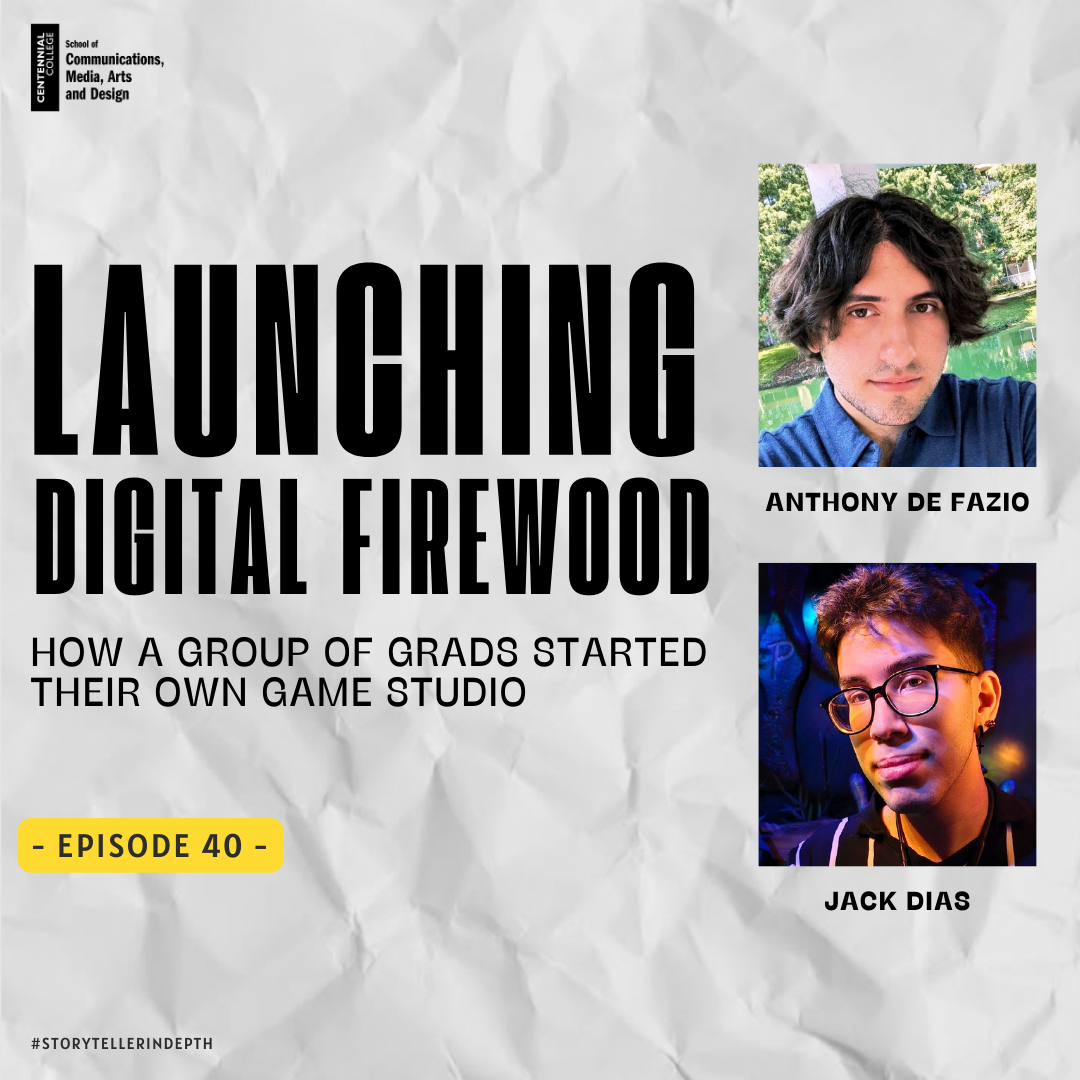Episode Transcript
[00:00:00] Speaker A: Hello and welcome to Storyteller in depth, a podcast where we go behind the scenes to learn more about the school of communications media Arts and designs, people, places and things. I'm your host, Pat Quigley. In today's episode, we have Maria Bowie, a graduate of our children's media program. It was announced that Maria is this year's winner of the Steven Denier Children's content internship, an exciting opportunity that has involved her interning at low PI Productions. But Maria will be getting into all of this and so much more in this episode, including some of the skills she thinks are most important for someone to have when entering the production side of the children's media industry. So let's get into the episode.
Thank you so much, Marie, for being on the podcast today.
[00:00:58] Speaker B: Pleasure to be here.
[00:00:59] Speaker A: Yeah. And so just to start off, can you share what sparked your interest in pursuing the children's media industry and then the program at the School of Communications Media Arts and Design?
[00:01:09] Speaker B: Yeah, so I have a storage career in various industries before, but.
So, yeah, I guess during COVID is what really sparked my trajectory towards something different. I was working as an ece at a daycare, and I don't know if you paid attention during COVID but it got hairy and it was really stressful. And, yeah, I was, like, coming home in tears a lot. And my partner, who is super supportive, and I actually went back to school as a mature adult and created a second career later in life, was like, hey, maybe you should check something else out and explore other avenues. And he actually found a children's media program. It came up in a feed of his and he was like, this sounds amazing. So he sent it to me and I was like, yeah, I think it checks all the boxes of things that I'm into. Like, so before I became an ece, I worked in the music industry and I ran a record label. And so there was, like, the business end of it and then, like, arts and then children, and I was like, yeah, check, check, check. I'm in. And then I applied and I went through an interview process, and a few months later, I was in a lovely class of eleven folks who all shared the same interests as me. And, yeah. And here we are a year later.
[00:02:47] Speaker A: Wow.
[00:02:48] Speaker B: Thriving. Kind of.
[00:02:50] Speaker A: Well, we're post Covid now, you know. So everybody's thriving better than they were back then.
[00:02:54] Speaker B: Yeah, yeah, yeah.
[00:02:56] Speaker A: So what kind of originally got you so interested in wanting to work with children?
[00:03:03] Speaker B: I guess. I don't know. Well, I guess, yeah, I was. I was working in music and I was tour managing, and I was on tour with a couple, and they had a young child on tour with them. And I like the baby. Like, the care kind of fell upon me while we were touring, and I was the de facto nanny, and I was like, I like this kid.
There's something there. There's something about children that kind of bring out the best in me, and I'm sure everyone.
And then a friend of mine who was a musician started an arts, an after school arts program and, like, tapped all her, like, artist friends to kind of run it with her. And we ran that for nine years, eight years. And so, yeah, like, I was hanging out after school with a group of, like, kindergarten. I saw them up until grade five.
And, yeah, like, we did amazing things together. They're so creative, and, yeah, they really inspire me to just, like, do crazy things and kind of look at the world in a different light. So I always want to be around kids. Like, if ever there's, like, a dry spell, like, I don't have kids of my own, and I think that's also something. It's like, I don't have kids of my own, but I will gladly hang out with kids and get paid to do it and, and feel great about it.
[00:04:38] Speaker A: And so what kind of, like, you talked a little bit about the, the why you are so interested, like, why you love working with kids, but, like, what is it about children's media that kind of clicks for you? Like, what, what does it make you want to work in that field?
[00:04:55] Speaker B: Oh, children's mediaev. Yeah, I guess, like, children's, like, we're all consumed by media these days, so it's kind of like that first barrier, like, or like that first passage between kids and the world, right? Like, they're in front of screens before they experience a whole lot of things, so why not start there? And, I mean, I grew up, I'm like an eighties kid, so, like, I grew up in front of a screen and, like, so much of it, like, informs my life and, yeah, there's, like, some real magic that happens behind and on the screen. Right? So, so, yeah, I think, like, it's, we're inundated with media, so, like, that's a great way to kind of get any message or any lessons across and, yeah, oh, I guess. And then also, like, my, all my friends and partner, uh, work in, like, film and tv, so also they're just like, yes, come, come with us. So, yeah, it, it's kind of seamless.
[00:06:01] Speaker A: I've got a son who's about six months old now. And my, my partner, my wife, she tries very, very hard to limit screen time, and that was something, you know, we're working on very hard. But one thing that kind of, I don't want to say, slips through the cracks. And hopefully she doesn't listen to this episode. But, you know, we. We do sometimes let him watch Sesame street, and old Burton Ernie is his jam, right? That's his thing.
And so, like, when we go through it and we look at other children's media examples and other shows and stuff like that, we're like, okay, why is it that he goes towards this one opposed to other ones? And, you know, we're just.
[00:06:37] Speaker B: He chooses Sesame street.
[00:06:39] Speaker A: Chooses Sesame street over most other children's media forms. And I'm like, all right, well, I guess the classics are where it's at.
[00:06:45] Speaker B: Yeah, yeah, yeah. I guess, like, your, like, I wonder if, like, there's the way that you do. You do, like, co watching, like you say? Yeah, I think they can kind of pick up on what you like, too, right. And that's, like, something that's really important that I learned, like, in taking this program where it's, like, so much of the stuff we make, it's, like, for kids, but a lot of it, like, you have to. Have to. Have to appeal to the parents, too, because they're the ones kind of making the decisions on what their kids are watching. Yeah. Wow. And it's like, it's more fun to make it if an adult enjoys it, too. It's like, you don't want to make, you know, mind numbing stuff. That is annoying.
[00:07:28] Speaker A: Oh, for sure.
[00:07:29] Speaker B: Yeah.
[00:07:30] Speaker A: I could watch it all day, but, you know, at some point, you get a little bit tired of some of the songs, but, you know, it is what it is.
But getting back to, like, you know, the podcast side of things and talking about you, was there a project or moment in the children's media program that stands out to you?
[00:07:47] Speaker B: All the instructors that we had are, like, active in the children's media industry, the tv and film industry. So we got, like, firsthand experience.
One of the highlights, I guess, was in our.
It's in our marketing class, our marketing class taught by Paulie Beale.
We combined that with our broadcasting class. I think you might know Helen.
Yeah. So Helen helped us film a little short children's show that we came up with, and then that kind of went, like, that material we used to market on YouTube and created, like, a whole campaign around it.
And so we got, like, hands on experience on how to make and then market a show. And, yeah, we learned a lot of, like, weird YouTube algorithms, statistical stuff, and, like, we had, like, we paid for advertising and stuff. And then the one weird, awesome, fun thing that we did was, like, we did a grassroots campaign, which myself and my peer Kirsten brass headed, and we did, like, a weird egg hunt. I don't know if anyone. I guess you guys aren't on the campus at all, ever last year, but, yeah, like, we literally took over the story arts center and turned it into, like, an Easter egg hunt. Like, an evil Easter egg hunt, because it was a, like, evil scientists based television show. So, yeah, we hid slime eggs all around, and then we dressed up in, like, a bunny costume and mad scientist costumes, and we were yelling at people, chasing each other down the hall and filming it, and it was all on TikTok. And where are the other ones? Instagram.
Yeah. So that was, like, a fun takeaway. And, like, it's just like, yeah, like, work can be fun, but what else? Yeah, we had, like, lovely writing classes, and because the classes were so small, we all got, like, a really good sense of each other's style and voices at the end, and we got really close. And so, like, our critiques and, like, workshops were really informative and effective. Like, you know, we told each other what we thought and felt, and, you know, no one's feelings got hurt, and we're all stronger and closer because of it, but, yeah.
Did I answer your question?
[00:10:29] Speaker A: Yeah. No, for sure you did. You know, something that's really, really cool is that you are this year's winner of the Steven Denier Children's content internship. Now, this is awarded to only one or two students or recent grads from a canadian post secondary school who have an internship lined up at a canadian production or broadcasting company. This is such an exciting accomplishment for you. So, first, how did you hear about this internship? And what was your reaction when you found out that you were this year's recipient?
[00:11:00] Speaker B: Yeah. So this is all really low on Lopi. Like, lopi headed this, or, like, the producers that were working with Lopi at the time. So Chloe Gray, who is someone I knew from before I met Lopai. I was putting on, like, a kids show.
Like, I help out. Me and some friends of mine, we put on, like, kids concerts, like, family raves or, like, jams. Yeah.
And so she came out because we booked a band called the Mexican Mariachi Bros. I think they're called Mexican Mariachi Bros. Yeah.
And.
And she came out because she knew one of the people in the band. And then she told me, she's like, actually, he's the father of this production company, Lopi.
And I was just like, oh, Lopi. She's like, yeah, check it out. And then I checked it out, and I was like, wow, they seem amazing. Like, they put out amazing shows about, like, diversity and, like, inclusion, and, like, they're so good with representation, and they're, like, a tiny, small production company. So I was like, wow, okay. Like, on my radar. And then kind of, Chloe and I kept in touch, and then.
And then when our internship, like, opportunities came around, like, we have to do 200 and some odd hours of, like, a co op somewhere. I was just like, okay, I'm gonna get it at low PI. So I got the internship at low PI, and then, like, the first few days in, Chloe sent me the Steven de noir scholarship application. And then I, like, read it over. I'm like, actually, I think it comes from you guys. Like, you guys have to fill it out. So Lopi filled out the application on my behalf because they have to approve it. Like, because they. They're paying for half of it, right? So they filled it out. So it's really. I didn't do anything. It's all.
I'm brushing it all off, but, yeah, like, I don't think I had anything to do with winning. They have a good relationship with the YMA, the youth media alliance. So I think a lot of it is that maybe they, like, looked at my cv, and they were just like, she looks interesting, but I don't know.
[00:13:33] Speaker A: So let's talk about your interning at low PI. Like, can you share with our listeners the work you're doing there and what you're enjoying the most so far?
[00:13:42] Speaker B: Um, okay, so it, like, is in two parts. So I did my school internship, which I finished back in June. Yeah, late June. Um, so I did my school internship, like, my 200 whatever hours. Uh, and that was all on set, so. So we filmed a show called my bestest. Oh, sorry. Bestest day ever with my best friend.
And it's a tv show about kids and their pets, and they bring on their pets, and we do fun activities with the pets and kids. And so I got to work on set as a pa, just kind of learning set life and helped out with props a lot and did a lot of running around, and I just. Yeah. Chasing after animals and kids, which was a wonderful job. And that was, like, how many weeks? 20?
I don't know. Not 20 weeks.
Two months. I think it was, like, two months.
Two months of like, really intense schedule. So it was, like, ten to eleven hour days.
And then. Yeah, and then that finished, and then my school internship ended, and then I found out, like, the last two weeks of the shoot, I found out that I got the scholarship. So I was like, oh, okay, I guess I'm continuing.
So that's funny. When I found out, I was, like, literally running around maybe with, like, a bucket of water for a duck. When Renata or Georgina from Lopai, like, stopped me in the hall, she's like, congratulations. I was like, uh, for what? And she's like, you got the scholarship? I was like, oh, okay, cool. And then I just, like, kept. And I wasn't able, like, we. It was such a busy day, I wasn't able to, like, actually check to see what the heck it was until later that day. Um, anyways, yeah, so on set was amazing and fun. Got to meet so many people. The crew were fabulous. Like, lopai is so good at just, like, bringing together, like, a really nice, a nice team. And, like, when I say nice, I mean, it's just, like, everyone is just so kind, and I think that's rare in, like, film and tv. Like, there's a lot of ego, like, big egos, and there was none of that on this. And, yeah, it was just, like, a nice little family, and everyone was super friendly with each other. So, yeah, I got to meet everyone there and work really closely with everyone.
And then now the post production side of it is a little less exciting. I'm behind a desk, like, filling out applications and, like, putting on Isan numbers on credits, like, yeah, helping fill out credits and moving files around.
[00:16:41] Speaker A: So what did you like more, though?
[00:16:42] Speaker B: What?
[00:16:43] Speaker A: Did you like working on set, or did you like working kind of at the dusk?
[00:16:47] Speaker B: Uh, I guess being on set is much more exciting, but it, like, it breaks your body. I'm older, and, yeah, I don't have the energy of, like, a 20 year old anymore, but, um, yeah, I like both of them. And I think, like, the desk stuff, like, that's all the behind the scenes, and that's what makes it happen. Like, you need money. You need to, like, you know, balance your budgets and pay people, and so that's just as important. And, like, I aspire to be, like, in the producer realm, so I need to know all of it.
So it's all great. I'm not gonna. I'm not gonna choose favorites.
[00:17:28] Speaker A: That's fair. Based on your experience thus far in the industry and now, you know, working at this production company, what are some of the skills that you think are the most important for somebody to have when entering the production side of children's media industry.
[00:17:44] Speaker B: Skills.
I think being a people person is probably the best skill you can have just knowing how to talk to people and relating to people.
And I think, yeah, because everything's so precarious, you don't just get one job and stick with it, you're constantly bouncing around. So networking is the best thing you could possibly do in this industry. Just like get to know and befriend as many people as you can and ask lots of questions and just like keep in touch with everyone that you meet.
Yeah, I think if you want to thrive, you just got to build a really strong network and kind of put yourself out there. Like let people know what you're up to and know what other people are up to and just be curious in other people's lives and like what's going on in the industry. Like kind of read the trains and just like stay abreast.
[00:18:40] Speaker A: What would be something you would tell your past self, like before kind of getting into all of this? What would you tell yourself?
[00:18:48] Speaker B: I would warn myself that it's a lot of hard work. It's an intensive program. Like it's a full time, it's full time and so it's like you're in class for whatever, eight, 9 hours a day and then you're going home and you're like writing business plans and like writing scripts and. Yeah, so, yeah, it's like fully consuming. So I wasn't prepared for that. I thought like, okay, like you're in school. I didn't think the assignments would be so heavy, but yeah, I guess that and yeah, I don't know, take better notes.
Never look at them anyways. Just absorb it. Yeah.
[00:19:31] Speaker A: There are so many children's shows out there these days and like we talked about before, there's, there's a lot from the past as well. But in your opinion, what are some of the more key elements that are needed for a successful children's show?
[00:19:44] Speaker B: Yeah, like I mentioned earlier, I really feel like, like a good co watching experience. Like so something for the parents of is in there.
I like music, so like, like sound and music are like really important for me. Like just to kind of have it complementing whatever is on the screen and then casting is something that I learned getting into this program. Like I knew so I'm like a big odd squad fan. I watched like as, like even before I got into this program, like I knew it was like a special thing they won so many Emmys for a good reason. But casting, I think it's, like, if you could. If it's a fictionalized, like, scripted show, like, casting is so important, and just to have kids who can kind of deliver the line and still be real, um, yeah, that's important. And, like, yeah, just, like, kids with the Riz. You gotta find kids with the Riz. So, yeah, just. And it makes it more enjoyable and less cringy, but I guess, like, and just, like, having nice, warm messages, but not being, like, heavy handed. Like, no one wants to be lectured, right? When you're watching television, you're just trying to, like, be entertained. But I, you know, you can kind of sneak in some warm fuzzies in there.
[00:21:15] Speaker A: Oh, for sure. Yeah. And just before we wrap up, I was just curious, like, what are some of the areas of children, the children's media industry that you're most interested in pursuing in the future?
[00:21:26] Speaker B: Yeah, I mentioned, like, I want to produce, so I would like to kind of.
Kind of be at the helm of, like, a yemenite, a small show. Like, I really like what Lopai is doing. Just, like, low budget, relatively low budget stuff.
And I guess, like, everything's moving online now. So, like, YouTube. Like, people are watching. Like, kids are predominantly watching shows on YouTube now. So, like, maybe starting off, like, a little. A little show on YouTube. I'm working with my friends on this, like, kids concert thing.
Take it back. It's not a rave. It's, like, a kid's jam.
We call it electric circus for kids, if, you know, electric circus. But, yeah, kids dancing and playing music to bands that come into a space.
So we're hoping to kind of develop that and turn it into kind of, like, a variety show. Music based variety show on YouTube?
Yeah, I think just, like, doing my own shows and, like, small scale.
But, I mean, if I ever need money, I guess I would just go and work on set or in an office for a bigger production company. But again, right now, things are super, super duper tough for a lot of people. The industry is struggling financially. There's, like, tons of layoffs. Like, chorus just laid off a whole whack of people, and, like, everyone emerging, like, giant companies are just, like, eating up smaller companies. There's not. Yeah, it's a weird time. So I think, like, the safe and, like. So Suzanne Wilson, who is the instructor of our business class, one of her tips was, like, just figure out what you want to do and, like, pursue it on your own. Like, just, like, I don't like, get to know as many people as you can, but, like, try to do things on your own. Like, don't rely on other people's money.
Yeah, just like, that entrepreneurial spirit, which I think I have. I've run a few businesses before, but, yeah, that's super important because, like, it's. There's going to be tons of up and ups and downs, and if you can kind of figure out your own path, like, that'll be a lot smoother, for sure.
[00:23:54] Speaker A: Thank you so much, Maria, for coming onto the podcast today.
[00:23:58] Speaker B: Thank you for having me.
[00:24:07] Speaker A: Thank you so much, Maria, for being on the podcast. Your insight to this industry and experience thus far is truly incredible. Now, this is our 32nd episode of the podcast, so if you haven't already listened to the other 31, be sure to check those out. Our most recent topics have been around pop culture, lifestyle, media, screenwriting and casting, animated storytelling for children, and so much more. We have lots of episodes on the way, so until next time, I'm your host, Pat Quigley, and this is storyteller in depth.
